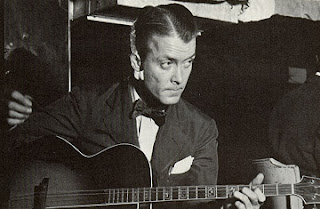It's February, 1929, New York City; six years before Benny Goodman and impresario John Hammond famously "integrated" jazz with Teddy Wilson and the Goodman Trio; eighteen years before Jackie Robinson broke into major league baseball; nineteen years before Harry Truman integrated the armed forces; twenty-five years before the Supreme Court's Brown v. Board of Education decision.
A young guitarist-banjo player named Eddie Condon goes up to Harlem to hear Charlie Johnson's band at Small's Paradise on 135th Street. "Somebody ought to put this music on records," he says to himself. "It's too good to miss." So Condon goes to Ralph Peer of Victor Records and makes his case: "I want to use [trumpeter Leonard "Ham"] Davis, [tenor saxophonist Happy] Cauldwell, and [drummer George] Stafford" [all from the Johnson band] with some friends of mine -- [trombonist] Jack Teagarden, [pianist] Joe Sullivan, and [reedman Mezz] Mezzrow."
Peer agrees to Condon's idea, saying, "I hope it's good." Here's one of the sides cut that day, That's a Serious Thing. The vocal is by Teagarden.
Not only was it good; it was history-making. As Condon wrote in his memoir, We Called It Music:
When the masters were cut Mr. Peer congratulated me. "You were right about the music," he said. "it is excellent. All in all I should say this has been an interesting experiment." It wasn't until I got out in the street that I realized what he meant. I made some inquiries: so far as I could discover we had made the first mixed recording date on any national label, using both white and Negro musicians. I thought it had been done long before.
The quote is typical of him. Eddie Condon had no socio-ethno-political agenda. He was color-blind for the purest of reasons; the music he loved was his only agenda.
Some years ago I was listening to this record and came to a startling realization. As far as I know, outside of civil rights organizing and lobbying, no other field of human endeavor on earth had blacks and whites working together in 1929 to produce something of lasting value and beauty.
In his long career Eddie Condon arguably did more to organize and promote pure jazz than anyone. He was also the unlikeliest civil rights champion in history. To my mind he's the most important and influential American cultural figure never to have been the subject of a major biography.
A serious thing, indeed.


Thank you for reminding us of just how wise Eddie Condon was in his ability to "embrace" "diversity" years before it became fashionable to do so. And the record stands the test / it doesn't harm anyone!
ReplyDelete